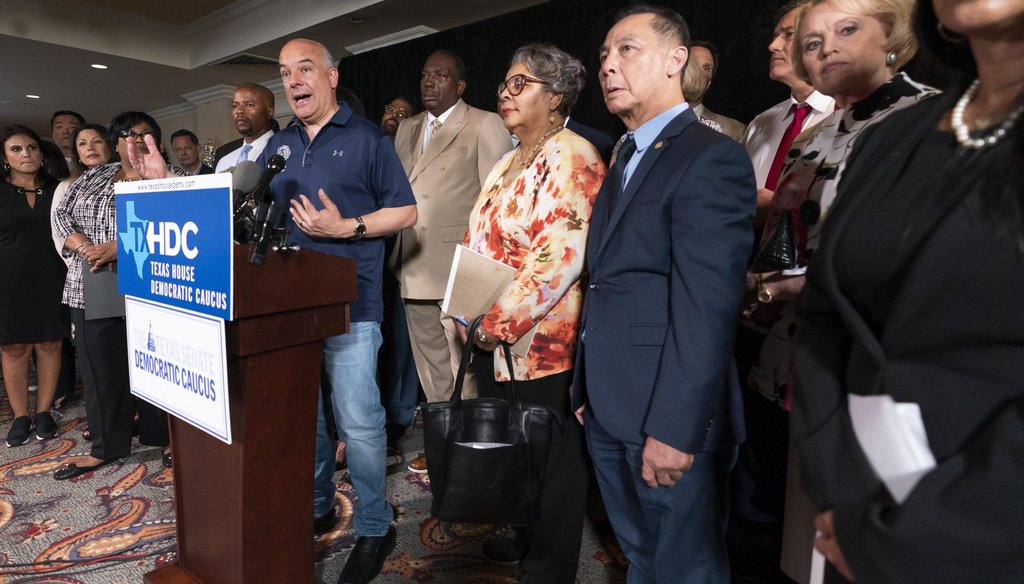Stand up for the facts!
Our only agenda is to publish the truth so you can be an informed participant in democracy.
We need your help.
I would like to contribute

Democratic Texas State Rep. Chris Turner, left, from Grand Prairie, speaks during a news conference with other Texas Democrats, Wednesday, July 14, 2021, in Washington. (AP Photo/Manuel Balce Ceneta)
Is there 'clear legal authority to handcuff' truant Texas Democrats?
On Tuesday morning, less than 24-hours after Texas Democratic legislators fled their home state to block passage of a GOP voting rights bill, USA Today reporter Savannah Behrmann caught up with U.S. Sen. Ted Cruz, R-Texas, for his thoughts on the errant lawmakers.
It’s nothing but a political stunt that is doomed to fail, he said. And as soon as they return to the state he expects their immediate arrest, echoing a pledge made earlier this week by Texas Gov. Greg Abbott.
"There is clear legal authority to handcuff and put in leg irons legislators that are trying to stop the Legislature from being able to do business," Cruz said in a hallway interview. And that "clear legal authority" is explicitly expressed in the state constitution, a fact he learned 18 years ago when state Democrats made their last exodus to thwart a GOP-backed congressional redistricting effort.
In 2003, before Cruz became a national household name, he was appointed to serve as the Texas Solicitor General by then-Attorney General Greg Abbott. That same year, Republicans’ redistricting plans were foiled when at least 50 Democratic state House members broke quorum and fled to Ardmore, Okla., forcing Texas Gov. Rick Perry to call a special session. During that special session, the Republican effort was scuttled again when 11 Democratic state senators made their own quorum-breaking getaway by fleeing to Albuquerque, N.M.
At the time, Speaker of the House Tom Craddick asked Abbott what legal authority the House has to arrest its absent Democratic colleagues. According to Cruz, that question was placed in Cruz's hands.
"Abbott asked me. I researched it. It turns out the Texas Constitution has a provision that explicitly authorizes fleeing House members to be arrested," Cruz recalled Tuesday.
But Cruz’s interpretation of the constitution doesn’t appear to be shared by all.
Interpretations of the Texas Constitution
Article III, Sec. 10 of the state constitution provides little guidance for the situation at hand. In one short paragraph, the document states that the House can "compel the attendance of absent members in such manner and under such penalties as each House may provide."
That language effectively grants authority over the handling of absent members to the Texas House Rules. Under the House rules, the remaining House members can issue a Motion for Call of the House, which directs the House's sergeant-at-arms to dispatch state police to find and return the missing members to secure a quorum.
"All absentees for whom no sufficient excuse is made may, by order of a majority of those present, be sent for and arrested, wherever they may be found," Rule 5, Sec. 8 of the House rulebook states.
While the language uses the word "arrest," there’s uncertainty about how this term is to be interpreted. Because none of these errant members have committed any crime, and the House cannot issue a criminal warrant for their arrest, they can’t be arrested in a criminal sense.
Although Cruz’s interpretation of the law finds that there is "clear legal authority" to handcuff Democratic lawmakers and put them "in leg irons," others treat this as a gray area of the law.
The reason why this question lacks clarity is because this hypothetical set of circumstances has no judicial precedent in Texas, said Randall Erben, an adjunct professor at the University of Texas School of Law and former legislative director to Abbott. There has been no judicial interpretation of enforcement of Rule 5, Sec. 8 of the House rulebook, and thus no existing authority on the matter in Texas.
"I'm not going to argue with the junior senator about this, but what I'm saying is there's no precedent anywhere for any of this," Erben said. "He may have found some authority someplace from somewhere, but it's not going to be relevant or on point to the interpretation by a court of competent jurisdiction, which under the Constitution is the only authority that anybody has to do this."
Cruz's office, which responded to questions after this article was first published, argued that the "clear legal authority" stems from the U.S. Constitution, which has a similar provision regarding absent lawmakers. Cruz spokesman Steve Guest points to a 1988 case in which an Oregon senator was brought into the senate chamber by police feet-first against his will.
Because there is no material difference between the language used in the U.S. Constitution and the Texas Constitution regarding absent lawmakers, Cruz's office argues that the 1988 case shows the extent to which officers can use force in returning lawmakers.
"Pretending that the law doesn’t clearly allow for the arrest and potential physical compulsion of delinquent legislators is patently absurd," Guest said.
Erben, however, said that the ultimate authority here rests in the Texas courts.
"We’re in Texas. The only authority that’s relevant as far as a judicial review would be the Texas courts, and Texas courts have never ruled on anything about the enforcement of any House rule provision," Erben said.
The only time in Texas history where a lawmaker came close to facing arrest for absenteeism was in 1979. During that legislative session, an alliance of liberal senators known as the Killer Bees broke quorum for several days and evaded police by bunkering in an Austin garage. After several days, one senator, Gene Jones, left the garage to visit his granddaughter in Houston, prompting state police to search for him at his Houston home.
"Photo in hand, they knocked on his door," recalled then-Lt. Gov. Bill Hobby. "A man who looked a lot like the picture opened the door. The ranger asked him if he was Jones. He said, yes. They arrested him and took him to Austin. He was Jones all right, but not Gene Jones. They had arrested Gene’s brother, Clayton. When the knock came at the door, the senator had jumped over the back fence and stayed lost for another day."
What does ‘arrest’ mean?
According to Sandra Thompson, a University of Houston law professor and director of the Criminal Justice Institute, the word "arrest" in the context of the House rules doesn’t grant officers an automatic right to use restraints or unreasonable levels of force. The use of restrains could only be used if a lawmaker posed a danger to public safety or to an officer’s safety.
"In a situation like this, they don't even have a warrant for a criminal arrest," Thompson said. "I think we really need to be thinking about this more in terms of an escort than trying to analogize it as a criminal situation."
Both Thompson and Erben agree that absent legislators can be ordered to return to the House floor, but it’s not clear what would happen if that legislator refused compliance. The Texas Department of Public Safety did not respond to questions asking for the agency’s interpretation of the law.
"It's at the extreme edge of parliamentary procedures," Thompson said. "I don't imagine that there would be a situation where a legislator would forcibly resist. That could present a really sticky issue."
"Under the authority of the rules of the House, they can be made to come back into the chamber," Erben said. "Now how that happens is up to every individual circumstance, every individual legislature, and every individual law enforcement officer if it comes to that."
Our ruling
Cruz said that there is "clear legal authority to handcuff and put in leg irons legislators" who break quorum.
The Texas House Rules states that absent lawmakers can "be sent for and arrested, wherever they may be found." But, because absent lawmakers aren’t charged with a crime, it’s unclear how the use of the word "arrest" should be interpreted in this context. This is because no Texas court has reviewed how this provision is to be enforced. Thus, there is no legal clarity.
We rate this claim False.
Editor's note: This story has been updated to include comments from Cruz's office.
Our Sources
U.S. Sen. Ted Cruz interview, July 13, 2021
Austin American-Statesman, Gov. Greg Abbott pledged to arrest Texas Democrats upon their return. Can he do that? July 14, 2021
Austin American-Statesman, 'It's a game of chicken': Texas Democrats' walkout has precedent, but will it work? July 13, 2021
Texas Constitution, including amendments up through Nov. 5, 2019
Texas House Rules, accessed July 13, 2021
Interview with Sandra Thompson, University of House professor of law and director of the Criminal Justice Institute
Interview with Randall Erben, adjunct professor at the University of Texas School of Law, July 14, 2021
Email from Steve Guest, spokesperson of U.S. Sen Ted. Cruz, July 20, 2021
Browse the Truth-O-Meter
More by Brandon Mulder
Is there 'clear legal authority to handcuff' truant Texas Democrats?
Support independent fact-checking.
Become a member!
In a world of wild talk and fake news, help us stand up for the facts.


















































